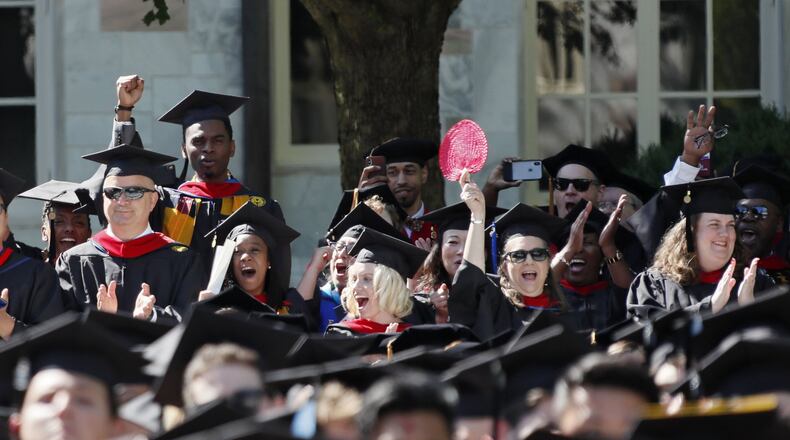There’s much to learn for international students, like Amanda Obando and Güldehan Durman, when they arrive in Atlanta for college.
The traffic. The slang. And recently for many of them, they’re learning about government red tape.
U.S. Citizenship and Immigration Services has been slow in approving work permits to foreign-born students like the two recent Emory University graduates that are required primarily for internships in science, technology, engineering and math and other work opportunities. Many students also rely on the jobs and internships for health insurance.
In years past, the standard wait time was about 90 days; it's currently grown to as long as five months at some of its processing centers, the agency's website shows.
Durman, who applied for her permit in April, delayed a visit to her family in Turkey because she said she can’t return to the United States without the permit. Obando did get her permit, albeit several weeks behind schedule, which allowed her to start an internship last week.
Several immigration rights advocates and attorneys say the delay is deliberate, citing the ongoing disputes between the Trump administration and congressional Democrats over issues such as border entry and visa policies. In addition to this delay, they blame White House immigration policies for a 7% enrollment decline of new international students during the 2017-18 school year, according to some news accounts.
The delays are associated with the federal Optional Practical Training program, temporary employment for some international students to work in various jobs and internships. It is an evolution of work programs for international students that began in the mid-1950s. The Obama administration in 2012 expanded the number of majors covered under the program, a move critics described as a backdoor attempt to circumvent the H-1B visa process, which is more difficult to receive and commonly used for high-skilled technology workers.
Eligible students can apply to receive up to 12 months of OPT employment authorization before or after completing their academic studies. The students, though, cannot apply for the program until three months before graduation.
Citizenship and Immigration Services officials declined an interview request, but said the delay is because it’s recently experienced a surge in employment authorization requests.
“As a result, there is a small backlog of cases that are pending beyond the standard 90-day processing time,” the department said via email. “USCIS has implemented a plan to address this and return to standard processing times soon.”
The students, immigration policy critics say, followed the rules, filed the application paperwork on time, but are being penalized.
“This is intentionally designed to make legal immigration difficult in the United States,” said Charles Kuck, a veteran Atlanta-based immigration attorney who said he met with about a dozen students last week from several Atlanta-area schools who’ve had delays getting their permits.
“It’s a nightmare,” he added. “An intentional nightmare.”
An Oglethorpe University official said 11 students applied for the permits, but only one received it, after 124 days. The delays are the longest she’s seen in more than 15 years, said Marisa Atencio, Oglethorpe’s director of Global Education.
Students at several Ivy League universities submitted petitions and open letters to their universities pleading for help, The New York Times recently reported. In Georgia, many students impacted by the wait are getting advice from the international student affairs offices at their schools or calling lawyers like Kuck.
Students interviewed did not take sides on the politics. They want to work. During a recent interview on Emory’s campus, Obando used the word “stressful” several times to explain the emotions she and other international students have felt waiting for the permits to be processed.
“In a sense, it’s like you are floating,” said Obando, 22, a native of El Salvador who majored in interdisciplinary studies. “You are looking for opportunities and you just wait. It’s stressful.”
Obando enrolled at Emory on the recommendation of a counselor at her school in El Salvador who graduated from the Atlanta school. She received a full academic scholarship and is considering attending graduate school in the United States. Obando last week began a 10-week paid internship doing social media, photography and writing for a company. She’s worried, though, about what happens once the internship ends. Her health insurance, which Obando said came through Emory, expires at the end of July.
“It’s nerve-wracking,” she said.
Obando’s situation, though, gives Durman hope. They met during the Emory application process and are friends. Durman, 22, submitted her application two months ago and is still waiting for a work permit.
For now, Durman is volunteering in a campus psychology lab, continuing her undergraduate research on visual cognition. Durman booked a flight to Turkey later this month and hopes the permit program paperwork will be processed while she’s visiting her family.
“I don’t think I would handle it well without friends like Amanda around,” Durman said of the wait.
“She is my resource.”
HOW IT WORKS
The federal government has a program called Optional Practical Training, temporary employment for some international students to work in various jobs and internships. Eligible students can apply to receive up to 12 months of OPT employment authorization before completing their academic studies or after completion. Students majoring in science, technology, engineering and math can get a two-year extension. The students, though, cannot apply for the program until three months before graduation. The application fee is $410.
About the Author
Keep Reading
The Latest
Featured


